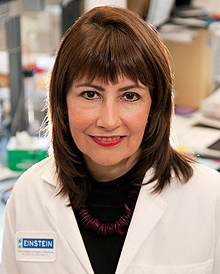

FULL STORY
Einstein Honors Dr. Nancy Carrasco With Its Third Annual Marshall S. Horwitz Faculty Prize for Research Excellence
Nancy Carrasco, M.D., a leading authority on the iodide-concentrating transport system of the thyroid and other tissues, has received the third annual Marshall S. Horwitz, M.D. Faculty Prize for Research Excellence during a special ceremony at Albert Einstein College of Medicine of Yeshiva University.

Dr. Nancy CarrascoThe award was established in memory of a beloved, long-time member of the Einstein faculty, Marshall S. Horwitz, M.D., who died in 2005. The award was presented to Dr. Carrasco by Allen M. Spiegel, M.D., The Marilyn and Stanley M. Katz Dean at Einstein.
As part of the program, Dr. Carrasco, who is professor of molecular pharmacology and of biochemistry at Einstein, delivered the third annual Horwitz Prize Lecture, which focused on her research over the past 20 years, concerning the iodide-concentrating protein transport system, known as NIS, and its key role in pulling iodide from the bloodstream and into cells of the thyroid gland, salivary glands, and lactating mammary glands. Her research has ramifications in thyroid disease and breast cancer.
Dr. Carrasco has been studying NIS since joining the Einstein faculty in 1987. Although the function of this system had been known for more than 100 years, the responsible mediator had not been identified at the molecular level. In a remarkable breakthrough in 1996, Dr. Carrasco's laboratory cloned the NIS gene and identified its key transport role.
Iodide is scarce in the environment and is an essential component of the thyroid hormones triiodothyronine (T3) and thyroxine (T4). These hormones play crucial roles in regulating metabolism in virtually all tissues and in governing the growth and maturation of the nervous system, skeletal muscle, and lungs of the developing fetus and newborn. NIS-mediated iodide uptake in the thyroid gland is the extremely important first step in synthesizing T3 and T4.
More recently, Dr. Carrasco has identified spontaneous NIS mutations as the cause of congenital iodide transport defect (ITD) in patients and has characterized these mutations, leading to important structure/function insights regarding NIS. Dr. Carrasco also found that endogenous NIS expression occurs in breast cancer � the basis for her suggestion that radioiodide may be a novel approach for the diagnosis and treatment of this disease.
In the area of public health, Dr. Carrasco has found that perchlorate � a pollutant found in water supplies in 22 states � poses a greater health risk than previously realized, particularly to nursing infants. Her research showed that NIS translocates perchlorate from the mother's bloodstream and into breast cells, where it becomes concentrated in breast milk. In fact, NIS exhibits a higher affinity for perchlorate than for iodide. Nursing mothers exposed to high levels of perchlorate in drinking water may, therefore, provide insufficient iodide to their babies � compromising their babies' ability to synthesize sufficient amounts of T3 and T4 hormones and potentially causing them to become mentally impaired.
Dr. Carrasco has published more than 80 papers and reviews in major U.S. and international journals. Her paper on the cloning of NIS has been cited more than 550 times. She also is a frequent speaker at major international meetings and research institutions around the world, serves on the editorial boards of the Journal of Biological Chemistry and Endocrinology, and is a reviewer of many other journals. Since 2006, she also has served as president of the Society of Latin American Biophysicists (SOBLA).
Dr. Carrasco has received numerous awards and prizes, including the Pew Award in the Biomedical Sciences (1989), the Arnold and Mabel Beckman Foundation Award (1991), the Maria Sibylla Merian Award (Essen, Germany, 1998), the Merck Prize of the European Thyroid Association (Warsaw, Poland, 2001), Rose Pitt-Rivers Lecturer at the British Endocrine Society Meeting (Glasgow, Scotland, 2003), and the Noun Shavit Award (Ben-Gurion University, Beer-Sheva, Israel, 2008).
A native of Mexico, Dr. Carrasco earned her medical degree and her master's degree in biochemistry from the National Autonomous University of Mexico in her native Mexico City. There, in the laboratory of Dr. Antonio Pe�a, she began her study of transport proteins, the cell-surface proteins that ferry ions and other molecules into or out of cells. After medical school, Dr. Carrasco received a Fogarty International Fellowship from the National Institutes of Health and then became a postdoctoral fellow in Dr. H. Ronald Kaback's laboratory at the Roche Institute of Molecular Biology in New Jersey. She and her husband, Dr. Samuel Zyman, a faculty member at the Juilliard School, currently reside in Manhattan. Their son Erik is a freshman at Princeton University.
Photo Gallery
Posted on: Friday, February 27, 2009

















Tablet Blog